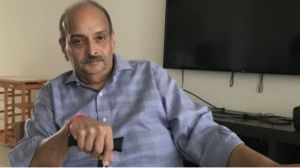Our own Gandhigiri
It’s not his non-violence. It’s not his vegetarianism or abstinence. It’s not even his Satyagraha. And while not undermining their strength and success, I find all these mere outer ramifications of the man’s inner actions.

It’s not his non-violence. It’s not his vegetarianism or abstinence. It’s not even his Satyagraha. And while not undermining their strength and success, I find all these mere outer ramifications of the man’s inner actions. They are an extension, a reflection of Gandhi’s personality, his core. The core itself is one of great conviction, a swadharma — discovered and practised by himself — that led to swaraj, non-cooperation, Dandi march and all the other ideas we saw him wear, ideas that were as simple as his clothes and therefore startling in a complicated world. It is his swadharma, own becoming, that is the key to, and substance of, the man.
Influenced by Hinduism, his religion was not exclusive. As he said, “If I could not accept Christianity either as a perfect, or the greatest religion, neither was I then convinced of Hinduism being such.” Today, as Lage Raho Munnabhai repackages Gandhigiri into digestible bites for the rest of us to savour, let us not get distracted by only the outer crust of the man.
I believe Gandhi’s unique method of fighting passively was a method that suited him. During the same period fought Bhagat Singh and Chandrashekhar Azad, for whom the Motherland was as holy as it was for Gandhi. They were as single-minded in seeking freedom as Gandhi was. But like there are as many number of Truths that lead to the same Oneness — a Hindu, a Christian, a Muslim and all the 43,870 groups of adherents across the world — there are as many paths.
To say that Gandhi’s path is the only one, or even the best one, is an error of judgment. Gandhi’s path suited Gandhi — and, of course, a large group of people who followed him. His path suited him at that particular time period. Just like our truths — one man’s truth can be another man’s falsehood. What Gandhi did was to express his truth. Humbly. Simply. Firmly. It attracted a large populace, but I suspect not all of them really lived that truth, that conviction. That belonged to Gandhi and to him alone.
Today, as we celebrate his birthday, let us not be swayed by the touchable manifestations of his work and attempt to cut-paste it on ourselves. Instead, let us focus on the unique path that all of us can discover for ourselves and travel on. Just like he did.
—gautam.chikermane@expressindia.com






- 01
- 02
- 03
- 04
- 05

























